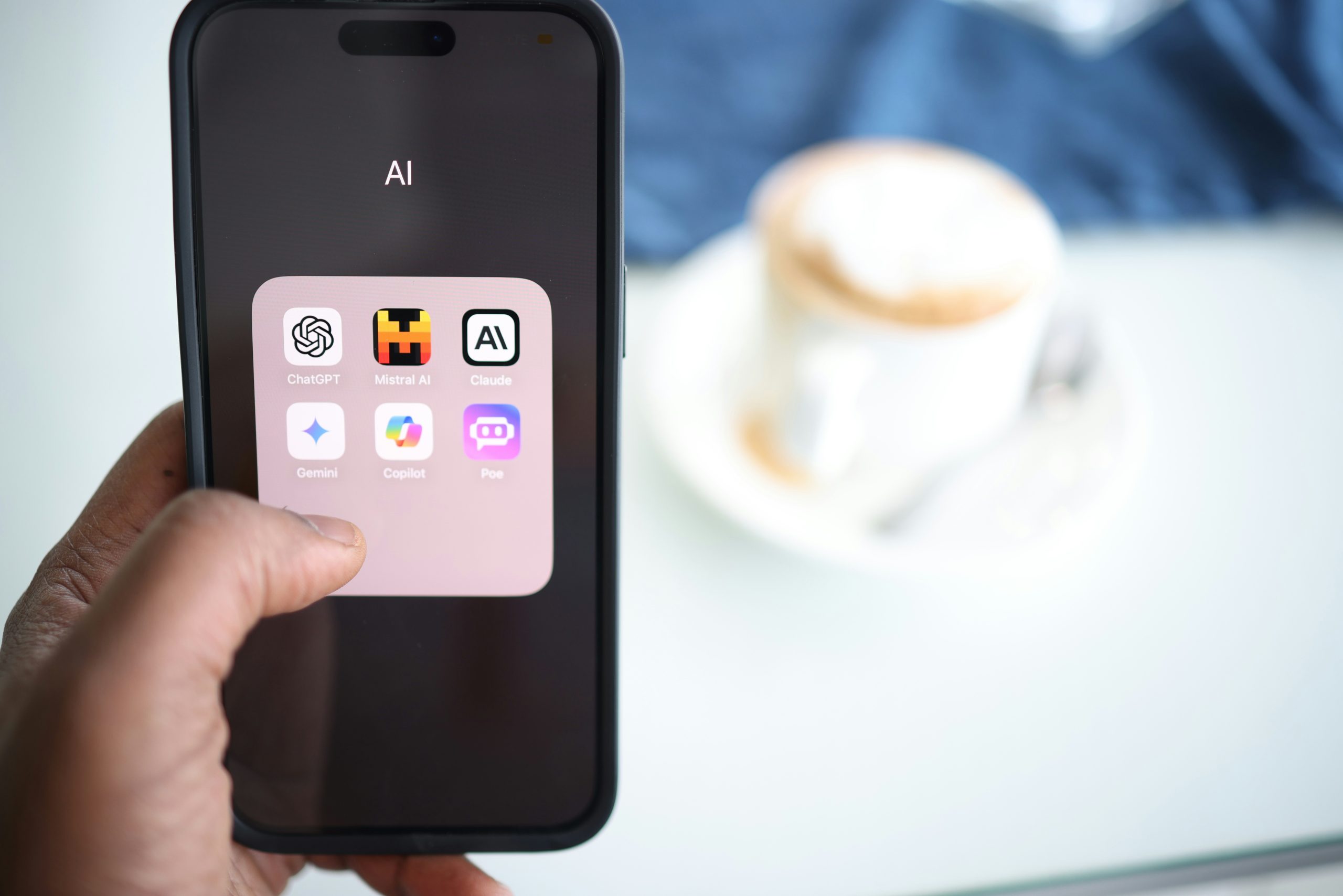Photo by Solen Feyissa
Writers, teachers, and marketers have been following the evolution of creative AI closely. In writing groups, you’ll hear that it’s producing poor quality content and yet still limiting or eliminating writing jobs. In education, the AI conversation usually revolves around how to keep students from using it to cheat. In marketing, there are concerns, but there also seems to be an interest in how AI might help. Is this curiosity from marketers because they are just plain exhausted? Marketing today requires so much activity and so much content, maybe the idea of digital help – even with some risk – is appealing.
So can AI be used for good? Let’s work with an AI tool to craft an answer – the same thing educators teach students to do, the same thing writers do when I’m researching topics, and the same thing marketers can do to get the most out of AI tools.
In almost every case, using an AI tool exclusively for content creation is risky and often produces less-than-desirable results. Using an AI tool and claiming it’s fully your original work is unethical. But the middle ground – working with AI to maximize your effectiveness – is an option for us all, if we take the time to learn how to use the tools available.
Let’s ask ChatGPT a very specific question:
How do writers use AI?
The answers weren’t any good. It was a list of writing practices (outlining, editing, generating ideas, research). That was the wrong question!
How can AI help marketers and writers with creative work?
With that prompt, a list of topics that were exactly right appeared in just a few seconds. A person may have gotten the same result looking online or even talking to experts, but there was definitely no faster way to get the answer!
Here’s where the partnership comes together. I’m going to share that list with you now, but I’ve made a lot of changes. I ended up using about 80% of the topics generated by AI and none of the descriptions. Why? Because the topics were what I, as a creative, was looking for – even though they didn’t all resonate with me. Initially, I was worried that I might miss something, but now I feel confident that I have a comprehensive list that I can add my thoughts to. I wanted to work efficiently, and generating the list through AI allowed me to focus my time and energy on sharing my experiences and recommendations.
Ways to Use AI to Support Creativity
Generating Ideas and Outlines
This is exactly what I did for this blog post – I asked for a list of ideas. But you have to ask the right question, as I also demonstrated. With some refinement, I got a list of ideas I liked. I didn’t use all of the ideas, and I added my own descriptions, but it was a quick and thorough outline that saved me a lot of time and left me feeling confident in the result.
Improving Writing Efficiency
In addition to brainstorming and outlines, AI tools can be used for grammar checking, proofreading, and formatting. Are they always right? No. Are they right more often than they’re wrong? Do they force a writer to slow down and look at their work with fresh eyes? Yes and yes!
Research Assistance
I love research, but I would love a research assistant even more! Digging in and really experiencing the content you are writing about, whether it be a single written piece or marketing content, is an incredible way to design meaningful content. But there’s often a point of diminishing return. Frequently, a researcher finds themselves immersed in content with the final picture in mind, but there is additional research needed. That’s where AI can help – to fill in those details in an efficient way.
Content Generation
Do you need simple content? AI can create basic content like summaries, descriptions, or even articles based on data you provide. You have to be actively involved, but it’s easier to edit than it is to author. AI can provide a great starting point when you need a lot of content or simple content that you can then make your own.
Personalized Writing Assistance
Have you ever tried asking ChatGPT to summarize a list of facts for you in an educational tone, then in a conversational tone, and then in a professional tone? Try it! Some AI tools can adapt to styles and preferences, allowing you to easily consider the differences. You’ll still want to make the final copy your own, but AI tools can be a great partner as you’re trying to find your voice or even shift your voice for different content.
Own Your Content
If I’ve convinced you that AI can be used successfully in at least some of your creative process, I bet there’s some part of you that still thinks it feels risky, right? That’s good! Remember: The goal is never to use AI to create content that we then claim as our own. The goal is to work with AI, which means following a few basic practices consistently.
- Know the limitations of the tool you’re using. An easy example – where is the data coming from and when was it last updated? Those two answers can drastically influence what questions you can ask and how much you can trust the responses.
- Never use AI content as your only source. It’s a great starting point, but what you generate has to be verified. You may check 100 results and never find a wrong answer, but don’t fall into a false sense of security. If you miss one error, it could cost you your audience.
- Always modify the content to match your voice. AI tools are best for brainstorming and outlines. Using word-for-word content is not only ethically questionable, it’s unlikely to sound like your brand. If you find rewriting too hard, stick to AI generated outlines. You’ll be amazed how much easier a good outline will make content creation!
- Use AI to work efficiently, being responsible with your time. Figure out where AI tools will speed up your process and where they may slow you down. If you ask for topics related to your industry on a weekly basis, and you find your AI tool just keeps repeating the same information, don’t use it for ideation. Get your ideas from old-fashioned research or a brainstorming session with humans and then try an AI tool to create titles related to the content, post outlines, or additional angles on hot topics. There isn’t one right way to use AI tools, so don’t be afraid to try different uses!
One final note – being creative can be exhausting. Some days, you wake up and ideas seem to be pouring out of your brain. Some days you wake up and every word you type seems wrong. AI can be especially helpful on those days when you are stuck – like I was when I did a final review of this blog post and needed a title. I just could not think of one, so I asked my AI writing partner.
What are 5 clever blog post titles about robots writing?
Certainly! Here are five clever blog post titles about robots and writing:
“The Write Code: How Robots Are Penning the Next Chapter in Literature”
“Artificial Authors: Exploring the Role of Robots in Writing and Creativity”
“Robo-Writers Unveiled: The Future of Content Creation in Digital Age”
“Wordsmiths of Steel: How Robots Are Redefining the Writing Process”
“Beyond Words: The Impact of AI on Narrative Structure and Storytelling”
Artificial Authors had alliteration, it was short and snappy – perfect. And I could have thought about a title all day and never landed on one I liked half as much. AI can be a great creative partner, if you know how and when to use it, and if you keep your own contributions at the heart of your work.
Author: Amy Jauman
 Dr. Amy Jauman, SMS, CDMP, LEAF, is an author, ghostwriter, international speaker, podcast researcher, and university professor. She is a certified social media strategist (SMS), certified digital marketing professional (CDMP), and certified law enforcement analyst – foundational (LEAF), with a master’s degree in experiential education, graduate certificate in crime analysis, and a doctorate in organization development. Amy has spoken at a variety of conferences on marketing topics, including the I.C.E. Exchange, Digital Marketing Institute, and the National Institute for Social Media. In addition to her ghostwriting projects, Amy has authored two marketing textbooks, five ebooks, and multiple articles and blog posts on the subject of traditional and digital marketing.
Dr. Amy Jauman, SMS, CDMP, LEAF, is an author, ghostwriter, international speaker, podcast researcher, and university professor. She is a certified social media strategist (SMS), certified digital marketing professional (CDMP), and certified law enforcement analyst – foundational (LEAF), with a master’s degree in experiential education, graduate certificate in crime analysis, and a doctorate in organization development. Amy has spoken at a variety of conferences on marketing topics, including the I.C.E. Exchange, Digital Marketing Institute, and the National Institute for Social Media. In addition to her ghostwriting projects, Amy has authored two marketing textbooks, five ebooks, and multiple articles and blog posts on the subject of traditional and digital marketing.




0 Comments